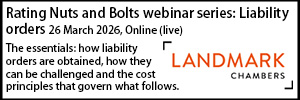Claimants vow to appeal High Court dismissal in Oxford bridge dispute
- Details
Local campaigners have vowed to appeal a High Court judge's decision to dismiss a legal challenge to Oxford City Council's decision to give itself planning consent for a new bridge.
Friends of Grandpont Nature Park have been working to challenge the council's approval of a bridge connecting Oxford's city centre to Grandpont Nature Park since September 2024, when they launched a crowdfunding campaign for their legal claim.
Campaigner Deborah Glass Woodin brought the case before Dan Kolinsky KC, who was sitting as a deputy judge of the High Court, on behalf of Friends of Grandpont Nature Park in February of this year.
Her claim advanced five grounds, which included an allegation the council erred in law by making a material mistake of fact in the committee report and/or by officers on the committee, and was given unlawful advice that an Environmental Impact Assessment screening decision could not be revisited.
It also argued that it was unlawful for officers to advise members that they should not allow themselves to be lobbied on the planning application and that Oxford erred in law by failing to take account of a 2016 report for Oxfordshire County Council affecting the area.
However, Daniel Kolinsky KC rejected all five grounds in his decision handed down in March 2025.
Commenting on the decision to dismiss the judicial review on 11 March, Cllr Susan Brown, Leader of Oxford City Council, welcomed the outcome, adding: "While it is important that people have the right to challenge decisions through the legal process, the Government has been clear judicial reviews should not be used to block much-needed infrastructure that benefits communities."
Friends of Grandpont Nature Park have since said they will appeal the decision, noting that they were "bemused to say the least" following the High Court decision.
In a comment published to the group's Crowd Justice page, a spokesperson said: "The reasons given were at times peripheral to the main argument, occasionally illogical (the understanding of the word 'necessarily' was deemed extremely important in one argument, but 'integral to' didn't have to mean 'key-to' or 'unlocking' in another) and altogether hard to reason."
Adam Carey
Sponsored articles
Walker Morris supports Tower Hamlets Council in first known Remediation Contribution Order application issued by local authority
Unlocking legal talent
Legal Director - Government and Public Sector
Legal Officer
Senior Solicitor - Property
Locums
Poll















































